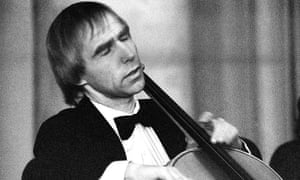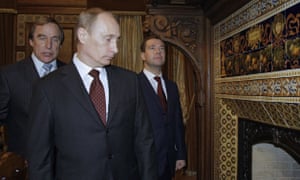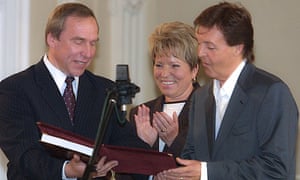A massive leak of documents shines new light on the fabulous fortunes of the Russian president’s inner circle
- Putin’s best friend: the cellist who holds the key to his fortune
- Iceland’s PM faces snap election over revelations
- What are the Panama Papers?
The Guardian
A network of secret offshore deals and vast loans worth $2bn has laid a trail to Russia’s president, Vladimir Putin.
An unprecedented leak of documents shows how this money has made members of Putin’s close circle fabulously wealthy.
Though the president’s name does not appear in any of the records, the data reveals a pattern – his friends have earned millions from deals that seemingly could not have been secured without his patronage.
The documents suggest Putin’s family has benefited from this money – his friends’ fortunes appear his to spend.
The files are part of an unprecedented leak of millions of papers from the database of Mossack Fonseca, the world’s fourth biggest offshore law firm. They show how the rich and powerful are able to exploit secret offshore tax regimes in myriad ways.
The offshore trail starts in Panama, darts through Russia, Switzerland and Cyprus – and includes a private ski resort where Putin’s younger daughter, Katerina, got married in 2013.
The Panama Papers shine a particular spotlight on Sergei Roldugin, who is Putin’s best friend. Roldugin introduced Putin to the woman he subsequently married, Lyudmila, and is godfather to Putin’s older daughter, Maria.
A professional musician, he has apparently accumulated a fortune – having been placed in ostensible control of a series of assets worth at least $100m, possibly more.
Roldugin appears to have been picked for this role because of his lesser profile. He has denied in documents to bank officials in Switzerland and Luxembourg that he is close to any Russian public figures. He has also said he is not a businessman.
Yet the files reveal Putin’s longstanding intimate has a 12.5% stake in Russia’s biggest TV advertising agency, Video International, which has annual revenues of more than £800m. Previously, its ownership was a closely guarded secret.
Roldugin was also secretly given an option to buy a minority stake in the Russian truck manufacturer Kamaz, which makes army vehicles, and has 15% of a Cyprus-registered company called Raytar.
He also owns 3.2% of Bank Rossiya. The St Petersburg private bank has been described as Putin’s “crony bank”. The US imposed sanctions on it after Russia’s 2014 invasion of Ukraine.
These assets are only part of a series of linked financial schemes revealed in the documents that revolve round Bank Rossiya.
The bank is headed by Yuri Kovalchuk. The US alleges he is the “personal banker” for many senior Russian government officials including Putin. The Panama Papers disclose that Kovalchuk and Bank Rossiya achieved the transfer of at least $1bn to a specially created offshore entity called Sandalwood Continental.
These funds came from a series of enormous unsecured loans from the state-controlled Russian Commercial Bank (RCB) located in Cyprus and other state banks. There is no explanation in the files of why the banks agreed to extend such unorthodox credit lines.
Some of the cash obtained from RCB was also lent back onshore in Russia at extremely high interest rates, with the resulting profits siphoned off to secret Swiss accounts.
A $6m yacht was purchased by Sandalwood and shipped to a port near St Petersburg.
Cash was also handed over directly to the Putin circle, this time in the form of very cheap loans, made with no security and with interest rates as low as 1%. It is not clear whether any loans have been repaid.
In 2010 and 2011, Sandalwood made three loans worth $11.3m to an offshore company called Ozon, which owns the upmarket Igora ski resort in the Leningrad region. Ozon belongs to Kovalchuk and a Cypriot company. Putin is the resort’s star patron and a reputed resident.
Eighteen months after the loans, the president used Igora as the venue for the wedding of Katerina. Her groom was Kirill Shamalov, the son of another of Putin’s old St Petersburg friends. News of the ceremony, from which cameras were banished, only emerged in 2015.
The records were obtained from an anonymous source by the German newspaper Süddeutsche Zeitung and shared by the International Consortium of Investigative Journalists with the Guardian and the BBC.
They reveal a number of other manoeuvres by the Putin circle to move cash offshore. There is nothing inherently illegal in using offshore companies.
The transactions, however, include apparently fake share deals, with shares “traded” retrospectively; multimillion-dollar charges for vague “consultancy” services; and repeated payments of large sums in “compensation” for allegedly cancelled share deals. In 2011 a Roldugin company buys the rights to a $200m loan for $1. “This is not business, this is creating the appearance of business in order to continually move and hide assets,” Andrew Mitchell QC, a leading authority on money-laundering, told BBC Panorama.
Such layers of secrecy surrounded the offshore deals that Bank Rossiya staff in St Petersburg sent all their instructions to a confidential intermediary – a firm of Swiss lawyers in Zurich.
The Swiss lawyers in turn arranged for Mossack Fonseca to set up shell companies, typically registering them in the secretive British Virgin Islands, with sham nominee directors from Panama to sign approvals for the deals. Even Mossack’s confidential records of true owners have frequently turned out to be further fronts.
Speculation over the size of Putin’s personal fortune has gone on for almost a decade, following reports in 2007 that he was worth at least $40bn, based on leaks from inside his own presidential administration.
In 2010, US diplomatic cables suggested Putin held his wealth via proxies. The president formally owned nothing, they added, but was able to draw on the wealth of his friends, who now control practically all of Russia’s oil and gas production and industrial resources.
In 2014, after Russia seized Crimea, the White House imposed sanctions on leading members of Putin’s circle, including Kovalchuk, citing their close ties to “a senior official of the Russian Federation” – a euphemism for Putin himself. The Panama Papers reveal that the Putin group appeared to have become nervous for unclear reasons after October 2012. Sandalwood was closed down and its operations switched to another offshore entity registered in the BVI, called Ove Financial Corp.
One of the companies linked to Ove Financial Corp belonged to Mikhail Lesin, Putin’s media tsar and former press minister. Lesin founded the Kremlin’s propaganda TV channel Russia Today but later fell out of favour. He was mysteriously found dead last November in a Washington hotel room with blunt force injuries to the head.
Asked about the offshore companies linked to him last week, Rodulgin said: “Guys, to be honest I am not ready to give comments now … These are delicate issues. I was connected to this business a long time ago. Before ‘perestroika’. It happened … And then it started growing and such things happened. The House of Music [in St Petersburg] is subsidised from this money.”
Roldugin declined to answer further written questions.
The Putin circle’s use of offshore companies contrasts with the president’s call for “deoffshoreisation”, urging Russians to bring cash hidden abroad home. Others who make use of offshore companies include oil trader Gennady Timchenko, Putin’s friend of 30 years. The US imposed sanctions on him in 2014. Others in the data are Arkady and Boris Rotenberg, Putin’s childhood friends and former judo partners. They are now billionaire construction tycoons. The Arsenal FC shareholder Alisher Usmanov also appears. He has at least six companies registered in the Isle of Man. There is no suggestion this is illegal.
Dmitry Peskov, Putin’s official spokesman, declined to comment on specific allegations against the president. Speaking last week, Peskov said western spy agencies were behind an all-out “information attack” against him to destabilise Russia before elections. Peskov dismissed the investigation by the Guardian and others as an “undisguised, paid-for hack job”. He said Russia had “legal means” to defend Putin’s dignity and honour.
RCB Cyprus said it could not disclose information about its clients. It said that in October 2013 it had “refined its strategy”. It had opened a branch in Luxembourg, received a new investor, and was now under direct European Central Bank supervision. Given this, it was “utterly unfounded” to suggest the bank was a “pocket” for top Russian officials. The bank said it had voluntarily submitted the allegations to Cyprus’s money-laundering authority. The auditor PwC Cyprus said it had audited RCB’s accounts but that it did not provide services to Sandalwood.
Lawyers for Kovalchuk said information about Bank Rossiya was publicly available. “We do not understand why you address these questions to Mr Kovalchuk.”
US political scientist Karen Dawisha said it was inconceivable that Putin’s friends had become rich without his patronage. “He takes what he wants. When you are president of Russia, you don’t need a written contract. You are the law.”
Panama Papers reporting team: Juliette Garside, Luke Harding, Holly Watt, David Pegg, Helena Bengtsson, Simon Bowers, Owen Gibson and Nick Hopkins




No comments:
Post a Comment